Japan and South Korea should lead the charge for democracy in Asia, argues Hudson Institute analyst John Lee. But recent developments cast doubt on that prospect.
In a rational world, South Korea and Japan ought to be the best of friends, argues Bard College professor Ian Buruma. Their cultures and languages are closely linked. Their economies are deeply entangled. And as the only liberal democracies in East Asia (along with Taiwan), they have to contend with the threat of North Korean belligerence and Chinese domination, he writes for The New York Times:
In a purely rational world, Japan would lead a democratic alliance with South Korea, Taiwan and much of Southeast Asia to balance the might of China. In a world fueled by historical passions, America’s retreat will almost certainly drive South Korea even closer to China, while Japan, possibly with a revised Constitution — and perhaps even, down the road, its own nuclear arms — might pull back behind its sea walls, hoping to be left alone by untrustworthy alien powers.
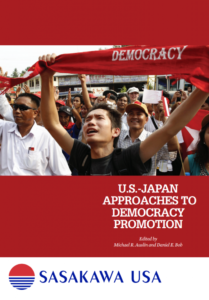 We thought South Korea and Japan share freedom, democracy, the rule of law, human rights and other universal values. What we have witnessed so far is to the contrary. South Korea looks more willing to depart from Japan, adds Kuni Miyake, president of Japan’s Foreign Policy Institute and research director at Canon Institute for Global Studies:
We thought South Korea and Japan share freedom, democracy, the rule of law, human rights and other universal values. What we have witnessed so far is to the contrary. South Korea looks more willing to depart from Japan, adds Kuni Miyake, president of Japan’s Foreign Policy Institute and research director at Canon Institute for Global Studies:
In the 2020s, South Korea’s socio-political transformation will be inevitable, whether one likes it or not. If anyone loses a free and democratic South Korea, it will be ordinary Koreans living in the south. If political leaders cannot provide strategic visions and realistic policies, it will ultimately be the people who lose their country.
What are the implications of Japan’s reorientation toward a “values-based” foreign policy mean for rule of law and democratic development in Asia? a recent National Endowment for Democracy forum asked (above).
Taiwan and South Korea are now mature, advanced democracies, despite their
relative youth, argues Stanford University’s Larry Diamond, co-editor of the Journal of Democracy. As a result, we should hope that South Korea and Taiwan would expand their now very tentative and fragmentary efforts to support democratic development in Asia and more broadly, he writes in U.S.-Japan Approaches to Democracy Promotion, a report from the Sasakawa Peace Foundation, edited by Michael R. Auslin and Daniel E. Bob.
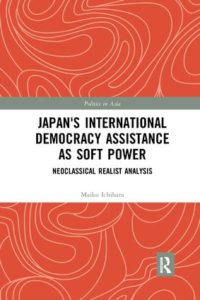 Japan’s democracy assistance reveals its intention to increase its political influence – or soft power – with regards to China based on democratic values,
Japan’s democracy assistance reveals its intention to increase its political influence – or soft power – with regards to China based on democratic values,
Japan has a strong tendency to follow the developmental approach to democracy assistance, even more exclusively than Europe, Ichihara argued in a Carnegie Endowment analysis, Understanding Japanese Democracy Assistance. The pronounced Japanese emphasis on directing democracy assistance to the state-institutions sector particularly reflects this fact. But it is possible that Japan will change its democracy assistance to reflect greater use of a political approach.
Japan and South Korea’s democracy support is largely subsumed under efforts to foster inclusive social development and they are the only two states that might be defined as non-Western to attend the D-10 Strategy Forum for officials and senior diplomats from ten democracies, Carnegie’s Richard Youngs has observed.
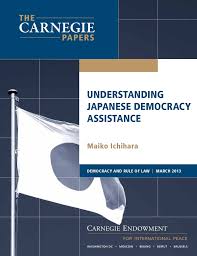 But democracies like Indonesia, Japan, and South Korea failed to join forces with respect to Myanmar’s political opening. Cooperation between Asian democracies was limited in response to the latest military coup in Thailand in 2014 as well.
But democracies like Indonesia, Japan, and South Korea failed to join forces with respect to Myanmar’s political opening. Cooperation between Asian democracies was limited in response to the latest military coup in Thailand in 2014 as well.
South Korea’s democracy provides lessons for other liberal democracies on how to develop resilience in the face of populist threats, observers suggest.
An assessment of South Korea’s democratization requires acknowledging juxtaposing patterns, according to Erik Mobrand of Seoul National University:
- On the one hand, the shadow of an authoritarian, Cold War state hangs over the country’s politics. State-society relations constructed under deeply illiberal circumstances did not disappear with the transition to democracy.
- On the other hand, developments in 2016-17 proved that South Korea’s democracy is among the most resilient in the world. When political institutions failed to prevent the corruption of an insulated elite, ordinary citizens intervened.
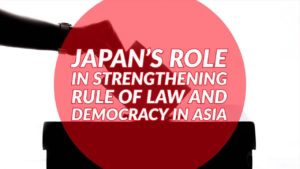 While “populism” runs roughshod over democratic institutions elsewhere, he adds, South Korea’s democracy has demonstrated a capacity to overcome serious challenges.
While “populism” runs roughshod over democratic institutions elsewhere, he adds, South Korea’s democracy has demonstrated a capacity to overcome serious challenges.
But Japan is not immune to the phenomenon of inequality and polarization feeding a potential populist upsurge, argues Ken Endo, a professor at the Hokkaido University Public Policy School.
According to economist Eisaku Ide, 31.2 percent of Japanese households are low-income with a take-home annual income in the mid-two million yen range. Only 5 percent, however, recognize that they are low-income earners. The rest, or 26.2 percent, consider themselves as middle class, and the disconnect between their actual and self-perceived financial situation must engender a lot of stress. It is a real possibility that this group could turn their discontent toward foreign workers and those with lower income. This is where the potential pockets of populists reside.
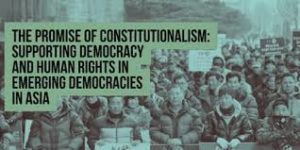 The Office of the Korea Chair and the Japan Chair at CSIS invite you to a special Korea Chair Platform event: The Importance of U.S.-Japan-Korea Trilateral Defense Cooperation featuring The Honorable Randall G. Schriver, Assistant Secretary of Defense for Indo-Pacific Security Affairs, U.S. Department of Defense.
The Office of the Korea Chair and the Japan Chair at CSIS invite you to a special Korea Chair Platform event: The Importance of U.S.-Japan-Korea Trilateral Defense Cooperation featuring The Honorable Randall G. Schriver, Assistant Secretary of Defense for Indo-Pacific Security Affairs, U.S. Department of Defense.
Wednesday, August 28, 2019
10:00 a.m. to 11:00 a.m.







